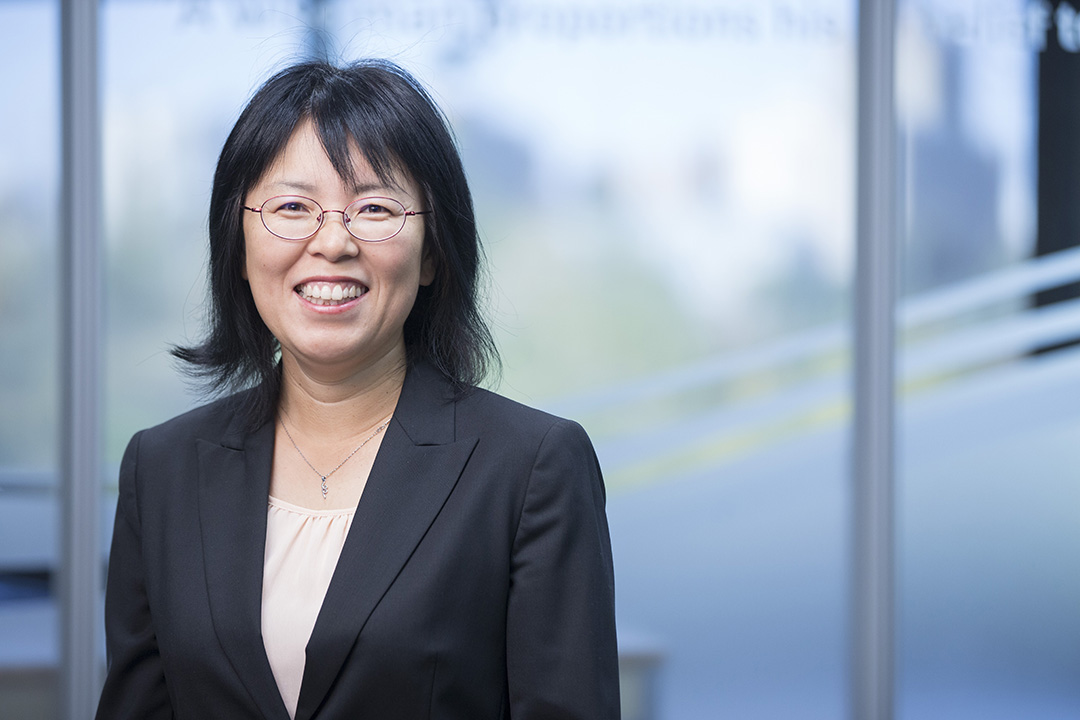
Asian Heritage Month: Profile of Professor Mou in JSGS
With more than 15 years of experience, Dr Haizhen Mou (PhD) brings an economist’s perspective to solving public policy problems that impact society, including health care, education, public finance, and barriers faced by immigrant women.
By Charvee SharmaA professor at the Johnson Shoyama Graduate School of Public Policy (JSGS), University of Saskatchewan (USask) campus, her research takes an interdisciplinary approach, integrating theories and methods from various disciplines. For Mou, academia felt like a natural choice, driven by her intrigue in political economy from a young age. Mou was born in Shandong Province, China, and moved from Beijing to Toronto to pursue a master’s degree in economics in 2002, joining JSGS at USask in 2009 after completing her PhD.
We caught up with her to ask about her latest book, research interests, and experiences as an Asian researcher.
Tell us a little about your ongoing research.
With SSHRC (Social Sciences and Humanities Research Council) Insight grant support, my latest book, Fiscal Choices: Canada After the Pandemic, co-authored with Dr. Michael Atkinson (PhD), JSGS professor emeritus, explores Canada’s fiscal health post-pandemic, revealing the strengths and limitations of traditional economic tools.
During the research for this book, we collected quantitative data, organized a nation-wide survey, and interviewed more than 70 politicians, bureaucrats, and representatives of academia, think tanks, and international organizations. We discussed problems such as economic growth, income and wealth inequality, government budgeting, monetary policy, fiscal federalism, and accountability in the management of public funds. A snapshot of the book can be found in an article published in The Conversation. For this research, we integrated theories of economics, political science, and public administration, and created a fiscal policy roadmap for the Canadian federal and provincial governments after the COVID-19 pandemic.
What are your research plans for the next few years?
I recently received two SSHRC grants and a SHRF (Saskatchewan Health Research Foundation) Align Grant. In my SSHRC Partnership Engagement Grant, I will collaborate with the Canadian Mental Health Association and assess the implementation and outcomes of the 2017 federal conditional transfer on mental health and addiction.
Through the SSHRC Insight Grant, I will examine the barriers that immigrant women face when using the national childcare program. I will study the effects of a universal childcare program and gender norms on immigrant women’s labour decisions, map their geographic accessibility to a childcare centre in their communities, and understand the other barriers by interviewing immigrant women in Saskatoon.
In the SHRF Align Grant, my post-doctoral fellow and I will study the implementation and outcomes of a team-based primary care model in a rural clinic.
What challenges did you face as a visible minority in academia?
As a short Asian woman, I, just like millions of other visible minority immigrants, had to work harder to gain recognition. The same level of accomplishments could be discounted and we often had to seek and fight for opportunities. One particular challenge is navigating the stark contrast between cultures. Many Asian cultures emphasize hardworking and modesty, whereas in Canada, there’s a need to advocate for oneself. This is a real, everyday challenge.
Personally, I’ve been fortunate to come across numerous friends, professors, and neighbours who went all the way to understand and help me. As an international student in Canada, my professors and classmates introduced me to skiing, skating, hiking, Canadian authors, and traditions that helped me acclimatize and feel home. At USask, many colleagues offered advice and support without even being asked. Some of them were trying their best to help international students and newcomers, and they were my role models.
If you could flip a switch, what would you change in your field?
I would add interdisciplinary training to every field. To solve public policy problems, we need economics, political science, sociology, philosophy, history, psychology, geography, and many other disciplines to work together.
In what ways does the area of your research align with University of Saskatchewan’s Signature Areas?
My research on government budgeting and public finance, primary care organizations, and public childcare programs helps enhance the well-being and sustainability of communities.
If you had a blank cheque, how would you fund your research?
If I had a blank cheque, I wish it was a cheque (for) research time. I have a lot of research grants now and I just need to roll my sleeves and get the research done!
Together, we will undertake the research the world needs. We invite you to join by supporting critical research at USask.

